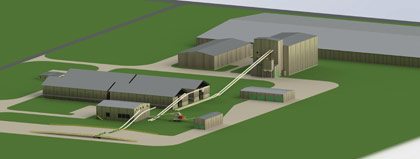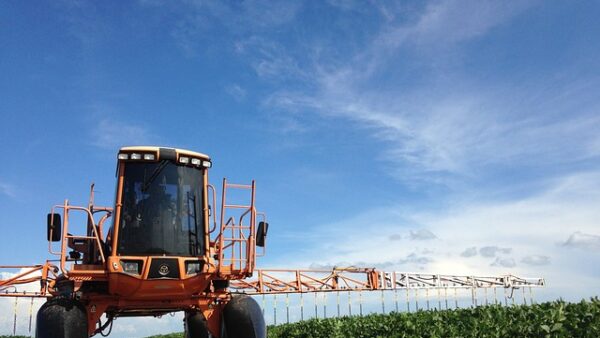Continued concerns about the economy may be clouding the horizon, but there is a silver lining: Agriculture is prospering and growing in rural areas, with the seed industry as a major contributing factor to this growth.
Uncertainty is still the watchword as concerns over critically low grain reserves, a looming food crisis, rising food prices, the European debt crisis and the U.S. economy casts a shadow over 2013. However, notwithstanding the drought of 2012, agriculture has successfully weathered storms on many fronts, and the seed industry, in particular, will be a critical player in overcoming many challenges in the future, including the growing food shortage, mitigating the effects of extreme weather events worldwide and improving the economy.
Peter Bratney, CEO of Bratney Companies, believes the industry is still going strong, despite past and current economic turmoil. And some seed companies, he says, are working toward improving the U.S. economy one county at a time.
Three-dimensional projection of completed AgReliant facility.
Projection rendered in SolidWorks by A. Staelmann of Bratney Companies. Photo courtesy of Bratney Companies.
Agriculture Going Strong
Throughout the past few decades, U.S. agriculture has seen the number of small-scale family farms shrink, and with that rural youth have left for greener pastures. The seed industry has been working in many areas across the Midwest to create new employment opportunities in rural areas. “The seed industry in particular wants to position their production facilities near where the seed is grown, and this has been welcomed with open arms in many rural areas,” says Bratney.
AgReliant Genetics, the third-largest seed corn company in the United States, is one such company. Recently, AgReliant announced that a $35-million seed corn production, distribution and conditioning facility is to be built in Boone County, Iowa. The first phase of construction is scheduled to conclude in August 2013 with final completion of the facility scheduled for the fall of 2014. Up to 25 year-round and 50 to 80 seasonal workers are expected to be hired.
Bill Lusher, county supervisor of Boone County, which has a population of approximately 26,000 people, is especially happy to see AgReliant set up shop in his area. Lusher explains that many small communities are struggling to survive these days, and with the introduction of new, good paying jobs this type of growth is extremely positive. “We are very excited at this prospect, as it provides a significant boost to our economy,” Lusher explains. “The long-term goal of our county is to have other companies see the benefit of moving into our area and attract more residents to our communities. This could also allow current residents the chance to reduce their commuting times, which means they will have more time with their families, and conversely more time to spend volunteering to make our community a better place to live,” he says.
Opportunities like this are supported by state programs such as Revitalize Iowa’s Sound Economy. Boone County representatives worked quickly to get approved funds through the program, which will allow them to update roads and obtain approval of all zoning requests, making the process fast and simple for AgReliant.
“The rural areas are more of a natural fit for our company, and most of the expansion of both people and infrastructure will continue in these areas.”
— Craig Anderson
Craig Anderson, vice president of AgReliant, says that although the company’s corporate headquarters is located in Westfield, Ind., the majority of planned growth for the company will be in rural markets. “The rural areas are more of a natural fit for our company, and most of the expansion of both people and infrastructure will continue in these areas,” he says. “People in rural areas naturally understand our business and are generally more supportive of the agriculture industry.”
Beck’s Hybrids, the largest family-owned seed company in the United States, is also looking at continued expansion in rural markets. They are currently operating farms they have coined with the umbrella term “Practical Farm Research” in Atlanta, Indiana and Illinois, and have decided to continue investment through similar developments in Kentucky and Ohio. The farms in Ohio and Kentucky will have 300-plus acres devoted to this type of research. Much of the development of these acres will utilize local resources for completion.
Practical Farm Research sites work to provide practical farm knowledge to local growers by utilizing cutting-edge technologies and replicating them in local areas. Although these research farms do create some employment opportunities, their main goal is to benefit local farmers by replicating farming practices in the areas where they are farming. Farmers are then able to apply these technologies knowing they have been tested and proven in their areas, generating more farm income through improved practices.
The PFR program completes over 60 unique studies annually. Some examples include a nitrogen inhibitor study, a fungicide timing study and a 100-bushel soybean attempt. All studies are created with the local farmer in mind and are based on new technologies and farmers’ ideas. A 250-page book on the various studies is created annually, which benefits farmers across the United States. Annually, regional field shows are held on each site, which assists in drawing large crowds to these rural markets.
According to Bruce Kettler, director of public relations at Beck’s, these expansions create positive effects through improved employment opportunities, use of local construction companies and improved profits for farmers in the area once they are able to successfully implement the new practices.
Seed industry expansions such as those taking place at AgReliant and Beck’s Hybrids are strengthening the agriculture industry, helping to promote agriculture in rural markets and strengthening the U.S. economy as a whole.
Jennifer Ewankiw
|
Seed Industry Spurring Growth U.S. Initiatives in 2012 • Dupont Pioneer opened a $40-million research facility in Johnston, Iowa, which will lead to 400 new jobs in the area. • Syngenta has begun a $63-million expansion in Nebraska, which will support contracting of an additional 5,500 acres in corn for the area. • Horsch Anderson broke ground on a new manufacturing facility in Mapleton, N.D., which will include a 100,000 square-foot building and add up to 80 new staff members within a five-year period. Global Initiatives in 2012 • Bayer CropScience plans to establish a new breeding center near Horsham in Victoria, Australia, which will focus on wheat and oilseeds. They will invest —12 million and add up to 20 new full-time employees. • The Alliance for a Green Revolution in Africa received US$56 million in funding from the Bill and Melinda Gates Foundation to assist small-holder farmers in sub-Saharan Africa to increase productivity. • Syngenta has announced a US$50-million investment to build a new corn and sunflower seed processing plant in Argentina, which will create over 2,000 jobs. |














